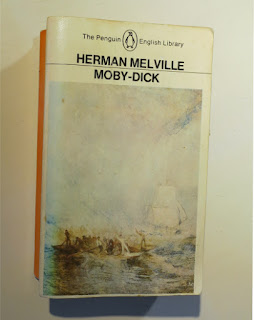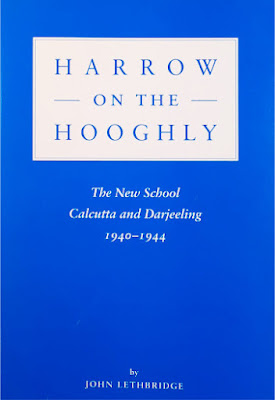Moby-Dick, by Herman Melville
Yes, I have just finished reading Moby-Dick. This particular copy here, with JMW Turner's picture of whalers on the front. Not one of his best paintings, but the scene is roughly contemporary with Melville's great opus. It's a very thick volume, over 1,000 pages. The story itself makes up over 600 of them. The rest? Mostly the commentary, ie. notes on Melville's text, shedding light on all the references and allusions, on the extraordinary scope of the novel's vision.
This great and famous American novel. Possibly one of the great unread novels, along with James Joyce's Ulysses, and that Stephen Hawking book, that guy who invented time (that's a Big Bang Theory joke). I've recently mentioned it to several friends, and the few who had tried reading it had all given up on it, even the Literature students. (I'm not going to cast any aspersions there - one time I was supposed to read Richardson's Clarissa, another standby of Lit courses, and managed about 10%; the guy I attended that tutorial with had read more, about a half I think. Why the notoriously acerbic tutor didn't blow us both out of the water I'll never figure out, it would have been obvious we hadn't finished it). So what gives here? The embarrassing truth is that I started it during my student days, read about two thirds of it, life threw me some distractions and I put it down. And then carried it around with me ever since. It has bugged me. So, many, many years later, I decided to read the last 200+ pages.
This must sound ridiculous; and before you say it, yes, I can't remember much of the preceding pages. But you need to appreciate the nature of the book. All of those disappointed would-be readers who gave up on it, probably - as I did - expected a yarn about the hunting down of the eponymous whale. Well, that does more or less happen in the book, but the plot while certainly not incidental is just the thread we find in the middle of a vast and almost inscrutable exploration of man in nature, of man as nature in eternal conflict with man the rational being. Much of the book takes the form of diversions into natural history, philosophy, literature, religion and myth. And sex. Oh yes, there's no escaping the veiled but often blatant eroticism; some of it on a level with Finnbar Saunders out of Viz (Finnbar Saunders? No? And his 'double entendres'?). So: Moby-Dick can seem like a mixture of all sorts of things, with some chapters of (apparently) straight narrative, while others parody scientific textbooks, and yet others take the form of drama script. It can feel all over the place. Hence why I wasn't too troubled by simply taking up the book again where I had left off.
Calling it a work of genius and one of literature's greatest achievements is probably a fair judgement. It's full of tension between its elements, but it's constructive not destructive. It would take an age to explain it all and having spent so much time glancing through those commentary notes, almost as much time as I spent reading it, I'm not going to try. But I'd like to dwell on a couple of aspects.
One is the whaling context. 19th Century whaling was so different to the later industrialised version that we can't see the world of Moby-Dick in the way that Melville did. And Melville did see it up close and personal, and was well placed to appreciate the heroism of the whalers and the appalling nature of what they did. Furthermore, in most Western countries today there is a very different attitude to whales and a feeling that we shouldn't be killing them at all. But don't be fooled into thinking that just because Melville writes for example a chapter on why the whale is a fish, and gives voice to the whalers' pride in their catch, that he merely views the whale as some sort of herd animal to be farmed. In fact, he does allow at one point that even then they could see the risk of overfishing the whale population.
As we get closer to the whale, and to the White Whale himself, we see man in poor comparison to its magnificence, and the whale as something which defies our presumptive lording over nature. And yet the whale isn't exaggerated: one thing which really impressed me about the last few chapters of the book is how well observed is the behaviour of the whale. Extraordinary though the White Whale is, it's a description which is true to life, to Melville's own observations and to the accounts of contemporary witnesses. I think it's this which helps the book transcend the radically changed context of whaling between Melville's time and now. Much time is spent discussing the parts of the whale. Some organs are familiar, some quite alien to us, but in 'delving into the flesh' in the way he does, I think Melville is exploring our own divided sense of ourselves, I mean between our intellectual view of ourselves, as against our fear so to speak of our own fleshly reality.
The other line of thought is merely that I find it hard to think of Moby-Dick as a novel, despite its possession of characters and a plot. I fully accept that there are so many passages to relish, in which he draws out the various contrasting personalities, and vividly describes the action of dramatic scenes. But to me it feels so much more like an epic poem. It certainly looks like prose, but the crafting of its language - listen to its rhythms and sounds -, the concern more with the symbolic qualities of characters than their story, and the weight given to imagery, reflects far more the work of a poet than a novelist.
It's very demanding, and not easy to recommend for a casual read. But it's there, for someone after a challenge, and there are rich rewards to be had.
This great and famous American novel. Possibly one of the great unread novels, along with James Joyce's Ulysses, and that Stephen Hawking book, that guy who invented time (that's a Big Bang Theory joke). I've recently mentioned it to several friends, and the few who had tried reading it had all given up on it, even the Literature students. (I'm not going to cast any aspersions there - one time I was supposed to read Richardson's Clarissa, another standby of Lit courses, and managed about 10%; the guy I attended that tutorial with had read more, about a half I think. Why the notoriously acerbic tutor didn't blow us both out of the water I'll never figure out, it would have been obvious we hadn't finished it). So what gives here? The embarrassing truth is that I started it during my student days, read about two thirds of it, life threw me some distractions and I put it down. And then carried it around with me ever since. It has bugged me. So, many, many years later, I decided to read the last 200+ pages.
This must sound ridiculous; and before you say it, yes, I can't remember much of the preceding pages. But you need to appreciate the nature of the book. All of those disappointed would-be readers who gave up on it, probably - as I did - expected a yarn about the hunting down of the eponymous whale. Well, that does more or less happen in the book, but the plot while certainly not incidental is just the thread we find in the middle of a vast and almost inscrutable exploration of man in nature, of man as nature in eternal conflict with man the rational being. Much of the book takes the form of diversions into natural history, philosophy, literature, religion and myth. And sex. Oh yes, there's no escaping the veiled but often blatant eroticism; some of it on a level with Finnbar Saunders out of Viz (Finnbar Saunders? No? And his 'double entendres'?). So: Moby-Dick can seem like a mixture of all sorts of things, with some chapters of (apparently) straight narrative, while others parody scientific textbooks, and yet others take the form of drama script. It can feel all over the place. Hence why I wasn't too troubled by simply taking up the book again where I had left off.
Calling it a work of genius and one of literature's greatest achievements is probably a fair judgement. It's full of tension between its elements, but it's constructive not destructive. It would take an age to explain it all and having spent so much time glancing through those commentary notes, almost as much time as I spent reading it, I'm not going to try. But I'd like to dwell on a couple of aspects.
One is the whaling context. 19th Century whaling was so different to the later industrialised version that we can't see the world of Moby-Dick in the way that Melville did. And Melville did see it up close and personal, and was well placed to appreciate the heroism of the whalers and the appalling nature of what they did. Furthermore, in most Western countries today there is a very different attitude to whales and a feeling that we shouldn't be killing them at all. But don't be fooled into thinking that just because Melville writes for example a chapter on why the whale is a fish, and gives voice to the whalers' pride in their catch, that he merely views the whale as some sort of herd animal to be farmed. In fact, he does allow at one point that even then they could see the risk of overfishing the whale population.
As we get closer to the whale, and to the White Whale himself, we see man in poor comparison to its magnificence, and the whale as something which defies our presumptive lording over nature. And yet the whale isn't exaggerated: one thing which really impressed me about the last few chapters of the book is how well observed is the behaviour of the whale. Extraordinary though the White Whale is, it's a description which is true to life, to Melville's own observations and to the accounts of contemporary witnesses. I think it's this which helps the book transcend the radically changed context of whaling between Melville's time and now. Much time is spent discussing the parts of the whale. Some organs are familiar, some quite alien to us, but in 'delving into the flesh' in the way he does, I think Melville is exploring our own divided sense of ourselves, I mean between our intellectual view of ourselves, as against our fear so to speak of our own fleshly reality.
The other line of thought is merely that I find it hard to think of Moby-Dick as a novel, despite its possession of characters and a plot. I fully accept that there are so many passages to relish, in which he draws out the various contrasting personalities, and vividly describes the action of dramatic scenes. But to me it feels so much more like an epic poem. It certainly looks like prose, but the crafting of its language - listen to its rhythms and sounds -, the concern more with the symbolic qualities of characters than their story, and the weight given to imagery, reflects far more the work of a poet than a novelist.
It's very demanding, and not easy to recommend for a casual read. But it's there, for someone after a challenge, and there are rich rewards to be had.




Comments
Post a Comment